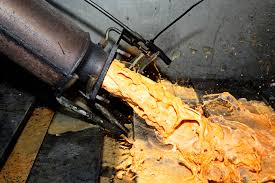The Importance of Proper Diesel Particulate Filter (DPF) Maintenance and Repair

Diesel engines have become increasingly popular in recent years, thanks to their impressive fuel efficiency and torque output. However, with the introduction of stricter emissions regulations, diesel vehicles have had to adapt to meet these new standards. One of the key components in this effort is the Diesel Particulate Filter (DPF), a crucial component in the exhaust system.
Introduction to Diesel Particulate Filters (DPFs)
A DPF is a filter that traps and collects particulate matter (soot) from the exhaust of a diesel engine. This helps to reduce the amount of harmful emissions released into the environment, making diesel engines a more environmentally-friendly option. DPFs are typically found in the exhaust system of modern diesel vehicles, including cars, trucks, and commercial vehicles.
Importance of DPF Maintenance
Proper maintenance and care of the DPF is essential for ensuring the long-term health and performance of a diesel vehicle. Neglecting DPF maintenance can lead to a variety of issues, including:
Preventing DPF Failure
If a DPF becomes clogged or overloaded with soot, it can eventually fail, leading to a costly replacement. Regular cleaning and servicing of the DPF can help prevent this from happening, ensuring that the filter continues to function as intended.
Improving Fuel Efficiency
A well-maintained DPF can also help to improve a vehicle’s fuel efficiency. When a DPF becomes clogged, the engine has to work harder to push exhaust through the filter, which can reduce fuel economy. By keeping the DPF clean and functioning optimally, drivers can enjoy better fuel efficiency and lower operating costs.
Reducing Emissions
The primary purpose of a DPF is to reduce the amount of harmful particulate matter released into the atmosphere. By properly maintaining the DPF, drivers can ensure that their vehicle is meeting or exceeding emissions standards, contributing to a cleaner and more sustainable environment.
Common DPF Issues
Despite their importance, DPFs can be prone to a variety of issues that can affect their performance and longevity. Some of the most common DPF problems include:
Clogging
Over time, the DPF can become clogged with soot and particulate matter, reducing its effectiveness and causing backpressure in the exhaust system. This can lead to a decrease in engine performance and fuel efficiency.
Ash Buildup
In addition to soot, the DPF can also accumulate ash, which is a byproduct of the combustion process. This ash buildup can cause the DPF to become increasingly restrictive, leading to the same issues as clogging.
Regeneration Problems
DPFs undergo a process called “regeneration,” where the collected soot is burned off at high temperatures to clean the filter. If this regeneration process is not working correctly, it can lead to a buildup of particulate matter and ultimately, DPF failure.
DPF Repair vs. Replacement
When a DPF issue arises, drivers have two main options: DPF repair or replacement. DPF repair typically involves cleaning or servicing the existing filter, while replacement involves installing a new DPF unit.
DPF Cleaning and Maintenance
In many cases, a DPF can be cleaned and serviced to restore its functionality. This may involve using specialized cleaning equipment or chemicals to remove accumulated soot and ash. Regular maintenance, such as scheduled DPF cleaning, can help to prolong the life of the filter and prevent more serious issues from developing.
DPF Replacement Options
If the DPF replacement has been severely damaged or is no longer functioning correctly, replacement may be the only option. Drivers can choose to install a new, OEM-approved DPF or opt for a remanufactured unit, which can be a more cost-effective solution.
Benefits of Professional DPF Service
While it is possible for some drivers to attempt DPF maintenance or repair on their own, it is generally recommended to have this work performed by a professional mechanic or service provider. There are several key benefits to this approach:
Expertise and Specialized Equipment
Professional DPF service providers have the necessary expertise, training, and specialized equipment to properly diagnose, service, and repair DPF-related issues. They can ensure that the DPF is cleaned, serviced, or replaced correctly, reducing the risk of further damage to the vehicle.
Ensuring Proper DPF Function
By relying on a professional service provider, drivers can be confident that their DPF is functioning as intended, providing the necessary emissions reduction and maintaining the vehicle’s overall performance.
Avoiding Further Damage to the Engine
Neglecting DPF maintenance or attempting improper repairs can lead to further damage to the engine and other components. Professional service can help to prevent this, protecting the long-term health and value of the vehicle.
Conclusion
The Diesel Particulate Filter (DPF) is a crucial component in modern diesel vehicles, responsible for reducing harmful emissions and maintaining the engine’s performance. Proper maintenance and care of the DPF is essential for ensuring the long-term health and efficiency of a diesel-powered vehicle.
By understanding the common issues that can affect DPFs, the options for repair or replacement, and the benefits of professional service, drivers can take proactive steps to keep their diesel vehicles running smoothly and responsibly. Regular DPF maintenance should be a priority for any diesel vehicle owner, helping to protect the environment, improve fuel economy, and extend the life of their investment.





